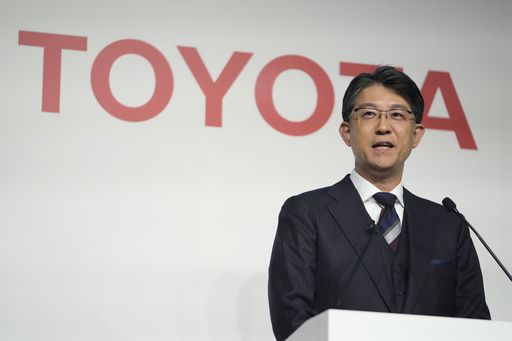Japanese automaker Toyota and energy company Idemitsu to cooperate on EV battery technology
Toyota Motor Corp. CEO Koji Sato, with Idemitsu Kosan Co. President and CEO Shunichi Kito, speaks during their news conference in Tokyo, Thursday, Oct. 12, 2023. Japan’s top automaker Toyota agreed Thursday to work with Idemitsu, a major Japanese oil company, on technology for the mass production of solid-state batteries that promise to be a key component in electric vehicles. (AP Photo/Hiro Komae)
TOKYO (AP) — Japan’s top automaker Toyota agreed Thursday to work with Idemitsu, a major Japanese oil company, on technology for mass production of solid-state batteries that promise to be a key component in future electric vehicles.
The deal is an important step for Toyota Motor Corp., which has promised to speed up its battery EV offerings and catch up after having fallen behind rivals like Tesla and China’s BYD. Toyota lags partly because of its success in hybrids, like the Prius, that are equipped with both gasoline engines and battery-powered motors.
Toyota, with its production finesse, and Idemitsu, which owns technologies in materials, said they are aiming for successful commercialization of all-solid-state batteries in 2027 or 2028, followed by full-scale mass production.
“With repeated efforts involving trial and error, we have succeeded in developing a material that is more stable and less prone to crack,” Toyota Chief Executive Koji Sato told reporters in Tokyo, after shaking hands with his counterpart at Idemitsu.
“The future of mobility lies in the tie-up between the auto and energy sectors, including this innovation hailing from Japan,” he said.
Solid-state batteries are widely believed to be essential for mass commercialization of battery-powered EVs. The lithium-ion batteries whose components are liquid are now commonly used in electric vehicles, but are prone to fires. Solid-state batteries are more stable and potentially more powerful, but generally more expensive.
“The era of the solid-state battery is right around the corner,” said Idemistu Kosan Co. Chief Executive Shunichi Kito.
Idemitsu has been researching basic technologies for all-solid-state batteries since 2001. Toyota started in 2006. Kito said recent innovations will help the batteries now in the works overcome the edge lithium-ion batteries have had over EVs.
The collaboration focuses on sulfide solid electrolytes, materials that are soft, adhesive and suitable for mass production, the companies said. Kito said Idemitsu developed mass production technology related to sulfide solid electrolytes by studying by-products from petroleum refining.
The companies plan a large pilot facility to develop sulfide solid electrolytes, paying special attention to quality and costs. Mass production would follow.
Many of the world’s top automakers are working on solid-state batteries, including domestic rival Nissan Motor Co. and American manufacturer Ford Motor Co. But some technological challenges remain.
Toyota, which makes the Lexus luxury models and Camry sedan, had said it will offer a commercial solid-state battery as soon as 2027, with charging time, one of the main drawbacks of electric vehicles, shortened to 10 minutes or less.
It’s planning to deliver 1.5 million EVs in 2026 by expanding its battery EV lineup.
___
Yuri Kageyama is on X, formerly Twitter https://twitter.com/yurikageyama
Copyright 2023 The Associated Press. All rights reserved


